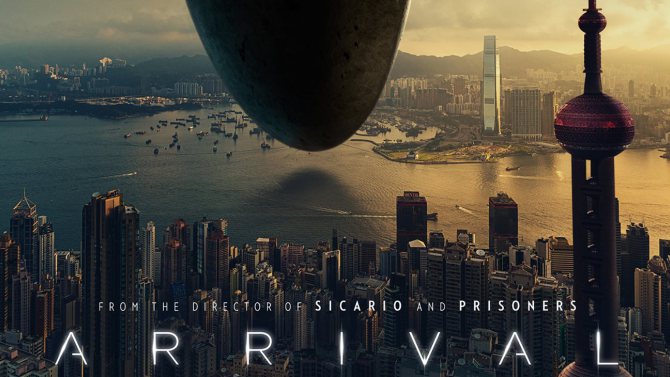Anchors (Out of Four): ![]()
“Arrival,” the newest film by director Denis Villeneuve (“Sicario,” “Enemy”), has given me a rollercoaster of personal feelings that started when I first saw the movie posted on IMDB’s upcoming list and finally ended in the last five minutes of the film. Let me explain.
When I first saw the posting for Villeneuve’’s new science fiction film on IMDB I was excited. I’m a big fan of all sorts of sci-fi, and it’s been awhile since audiences have gotten a smart, or at least interesting, alien invasion flick. When I saw the previews, I thought the choice to follow a linguist as a protagonist was an interesting one, but that overall the film looked average.
Then I went into the theater, and the word that sprung to my mind as soon as the opening scene began was “compelling.” One thing (among many) that “Arrival” can be commended for is that it grabs your attention and doesn’t let it go for the entirety of its runtime. That being, said by the end of the film I still felt less than satisfied.
Here’s the breakdown: I really liked the first three quarters of this movie. I thought all the pieces were in place to set up something really amazing. And then, at the end, that the story took a left turn that I saw coming but hoped wouldn’t happen, one that completely upended the momentum of the film and turned it into nothing more than a poor man’s “Interstellar” (2014). For a lot of people, this would be enough, but as someone who wasn’t dazzled by “Interstellar” either, it sadly wasn’t. Allow me to explain.
Let’s start with the things this movie does well. In any good alien invasion film, the viewer wants first contact to be memorable. In “Arrival,” the buildup to when our protagonist, Dr. Louise Banks (Amy Adams), first sees the aone of the alien ships known as “shells” creates a sense of tension and intrigue very reminiscent of the golden age of science fiction. Jets flying through the sky, panicked phone calls, dazed viewers watching the evening news, and nondescript military radio chatter quickly build a world with shades of “Them!” (1954) and “The Day the Earth Stood Still” (1951).
This tension mounts as “Arrival” paints a vivid portrait of modern society’s possible reaction to the alien threat. We see this on an international level, as American adversaries such as Russia and China begin to take drastically different approaches to the so-called arrival than the United States and its allies. Conspiracy minded talk radio hosts, riots in the streets, and a general sense of paranoia and fear one might expect with any world-changing event begin to slowly permeate each scene of “Arrival,” but it all functions in the background as Dr. Banks and her counterpart Dr. Ian Donnelly (Jeremy Renner) attempt to crack the code of how to communicate with the aliens.
These scenes tell the audience more about people than aliens, and if that’s what “Arrival” was about, with more and more mayhem ensuing from the socio-political reaction to extra-terrestrials on Earth, I would have been thrilled. Think 2011’s “Contagion,” but with flying saucers. That’s what I was beginning to expect about half-way through the movie, and maybe it’s the fact that my expectations were shattered that made me so annoyed by the end, but there are also some objective things to dislike about what “Arrival” becomes.
Science fiction has always been able to use what is often esoteric subject matter to shine a light on pressing contemporary moral issues, to explore philosophical debates while quenching our innate desire to explore the unknown. Ray Bradbury’s “The Martian Chronicles,” perhaps my favorite book, is a fine example of this principle in action (read it, if you haven’t already.) If “Arrival” had followed the path I had hoped, it would have been an excellent entry into that canon.
Unfortunately, like “Interstellar” before it, “Arrival” gives us the pretense of addressing some aspect of modern-day society before departing onto whole different plane altogether. I don’t want to spoil anything, so I won’t give away the twist, but maybe the fact that there even is one is what has me so perturbed. “Arrival’s” ending is quasi-philosophical faux-moralizing that failed to compel me as much as the more grounded scenes we see in the first and second acts.
In the end, “Arrival” just feels like it tries too hard to be something it didn’t have to be. Like Villeneuve saw recent films like “Interstellar” and “Inception” and thought “Wow, audiences love semi-surprising plot twists.” I wanted something Bradbury-esque, and what I wound up with is something Christopher Nolan might have written on a napkin. Because “Arrival” seems headed toward greatness and falters at the end leaves me feeling al the more hollow inside.
Verdict: Anchor down, I guess. All of the above isn’t to say this movie isn’t worth seeing. The good parts really do keep you glued to your seat, and based on the fact that most people disagree with me on “Interstellar,” most of you will probably disagree with me on this one too and find its choice of plot device to be a good one.

